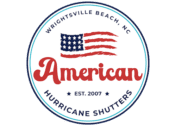Why Topsail Beach?
As residents of Topsail Beach, North Carolina, well know, the threat of hurricanes is a reality we must prepare for each season. With its stunning coastline, moderate climate, and beloved community atmosphere, many cherish their time in this idyllic location. However, safeguarding your property and loved ones from violent storms is paramount, making effective hurricane shutters a must-have. This blog post explores the various types of hurricane shutters available—specifically focusing on our main offerings of hurricane shutters. This includes Bahama shutters, accordion shutters, hurricane screens, colonial shutters, ClearTek rated polycarbonate, aluminum storm panels, and rolldown shutters—and discusses their benefits, aesthetics, pricing, and protection capabilities.
Understanding Hurricane Shutters
Hurricane shutters are protective barriers that shield your windows and doors from flying debris and high winds during a storm. In Topsail Beach, having robust hurricane shutters not only protects your investment but also offers peace of mind during hurricane season. All of our shutters are built of aluminum to resist corrosion and are available in a variety of coatings to protect the metal and enhance their beauty.
The Importance of Hurricane Shutters
Hurricane shutters serve several important functions:
- Property Protection: They provide a formidable defense against debris, wind, and rain.
- Insurance Benefits: Many insurance companies offer discounts for homes equipped with high-quality hurricane protection systems.
- Enhanced Safety: They improve the safety of your home and family during severe weather.
- Rain Protection: Shutters block out rain from impacting your window seams, mostly eliminating water intrusion during storms
Types of Hurricane Shutters
1. Bahama Shutters
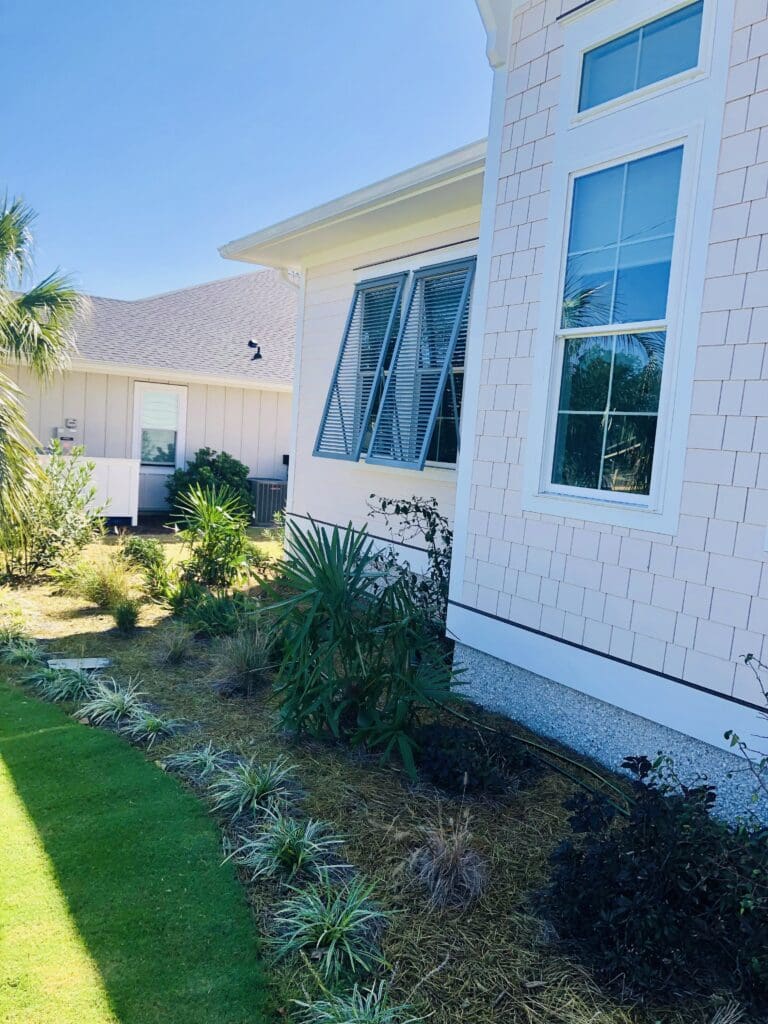
Description: Bahama shutters are a decorative yet functional option that adds a tropical flair to homes. They are mounted on the exterior of the windows and hinge at the top, allowing them to be opened and closed like an awning. Typically we install these shutters so they can be closed easily by turning a thumbscrew and collapsing the shutter. Then slide pins may be used to lock them in place for a storm.
Pros:
- Aesthetic appeal that complements coastal architecture. Perfect for Topsail Beach/Surf City and other coastal cities.
- Provides shade and ventilation even when closed.
- Easy to operate.
- Movable blades to allow more light penetration when needed, or none if desired.
- A variety of robust coatings are available- including Kynar 500 on specific shutter styles which has a 10 year warranty.
Cons:
- A manual option, so will take longer to lock down than electric options, but quicker than panels.
- More expensive than basic shutters.
Pricing: Typically starts at $800 per window and can go up, depending on size and custom features.
2. Accordion Shutters
Description: Accordion shutters fold open like an accordion, allowing them to be collapsed compactly when not in use.
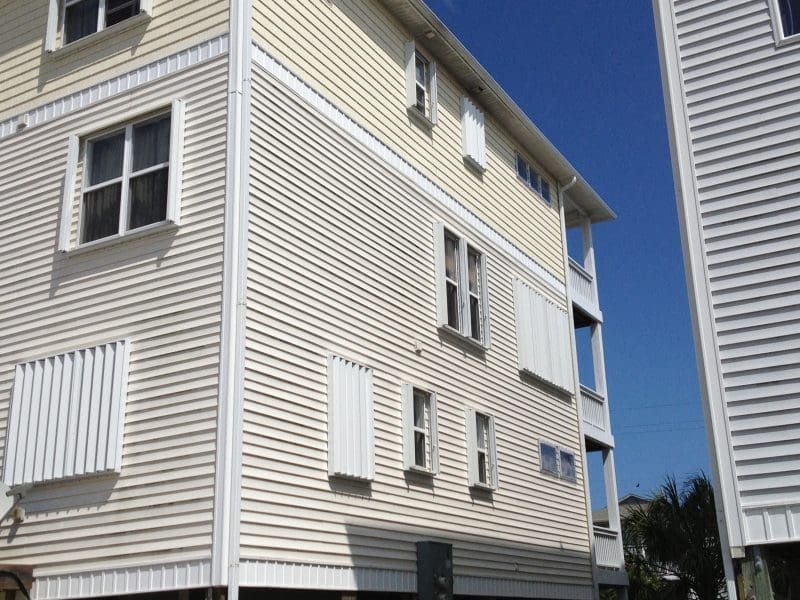
Pros:
- Easy to deploy and close.
- Adjustable to fit various window sizes.
- High level of protection against wind and debris.
- Security when locked down- many of our customers have an inside lock and use these as protection from thieves in the off season or after hurricanes. Topsail Beach often experiences bouts of looting after storms and inside close or locking shutters can prevent that.
- Clear blades or light holes are available for an extra cost.
Cons:
- If on the ocean, we recommend saltwater locks to evade corrosion for the closing mechanism, but offers less security than a lock.
- Less attractive when deployed than Bahama shutters.
Pricing: This type pricing generally starts around $450 per typical window installed, and will increase depending on the size.
3. Hurricane Screens
Description: Hurricane screens are mesh-like barriers made of Kevlar that attach around windows and doors, providing a flexible option for storm protection.
Pros:
- Can be operated manually, or ideally at the press of a button with our motorized option
- Offers protection from debris without obstructing views completely. You can see out through the mesh, but no one can see inside. Y Finally you can watch the storm or ocean at your home in Topsail Beach and finally ou will not be in a dark cave with hurricane screens!
- Can be integrated into new builds and hidden in the soffit and columns to provide a custom look and be completely out of sight
- Is flexible, so can be hit by debris and rebound without damage
- When installed on patios, reduces wind forces you can leave out your furniture in most storms.
- Solid Stainless Steel Bottom Bar and patented bullet hem system ensure it operates well- unlike many light screens like StormSmart or Fenetex which can get stuck due to light weight.
- Our Alutech United screens are the leading edge in hurricane screens, but require experienced installers.
Cons:
- We do not install these over windows unless there is a significant amount of room behind them due to deflection. Most are installed around the perimeters of patios for that reason. Some brick and concrete buildings may allow installation over windows, however the deflection on sliders and other large openings is often insurmountable if we are looking for an aesthetic solution.
Pricing: Generally prices out around $40 per square foot for manual screens, +$600 to electrify.
4. Colonial Shutters
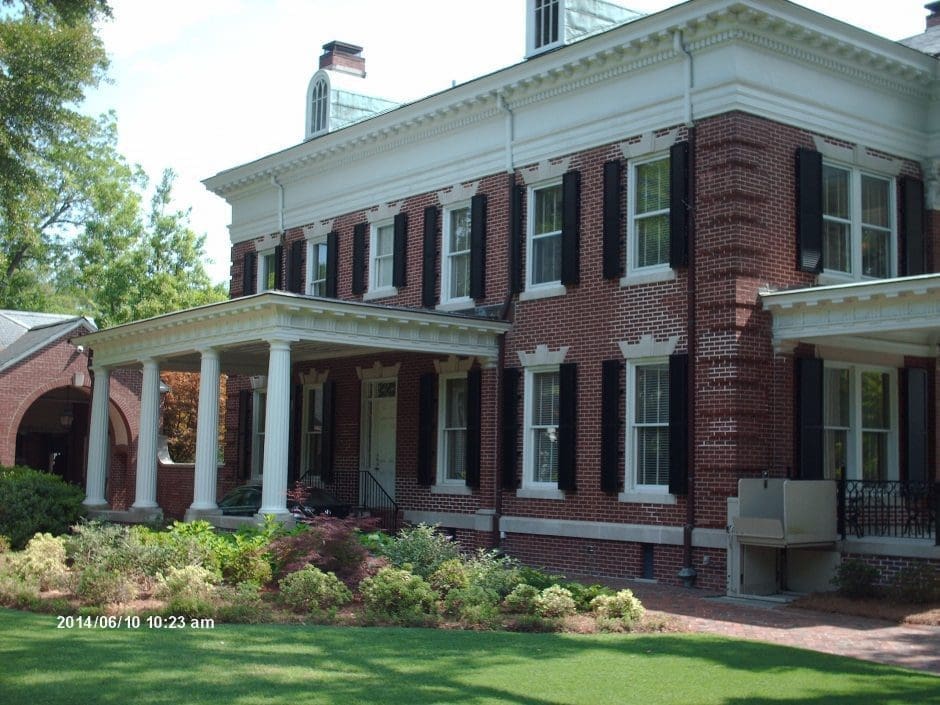
Description: Colonial shutters are a traditional shutter design, typically hinged on the side, allowing them to be closed over windows before a storm. Most people will recognize them as the shutters on old plantation style homes, once used for ventilation and insect protection.
Pros:
- Classic, attractive style that complements any home design.
- Provides a excellent protection when closed.
- Offers privacy and light control when not closed.
- A movable louver option is available, which some customers use to reduce solar gain in the home to reduce energy costs.
Cons:
- Is only hurricane rated if the storm bar is attached from the outside.
- Takes up space as they need to swing open.
- Takes longer to close than most other shutters since each shutter needs to close with a storm bar which must be screwed in
- Expensive and is best with certain styles of homes, coastal cities like Topsail Beach generally choose Bahamas over colonials for this reason.
Pricing: Generally costs $800 per shutter and up.
5. ClearTek Rated Polycarbonate

Description: This option uses a transparent, lightweight polycarbonate material that offers clear visibility while providing storm protection. This is the only rated clear polycarbonate on the market and uses silicone brackets to ensure that when the polycarbonate (aka Lexan) flexes under wind load, there is no cracking. Picture is from a home in North Topsail Beach.
Pros:
- Allows natural light to enter the home during a storm.
- Highly durable and resistant to impact.
- Has a UV rated coating, so will not yellow
Cons:
- Will not allow egress from the window, so typically installed on fixed, non-operable windows.
- Many people do not like the brackets and opt for a non-rated installation. However the latter is the same price, just uses a thicker polycarbonate shutter. However without the brackets, it may crack and offer less protection than ClearTek.
Pricing: Typically starts at around $28 per square foot.
6. Aluminum Storm Panels
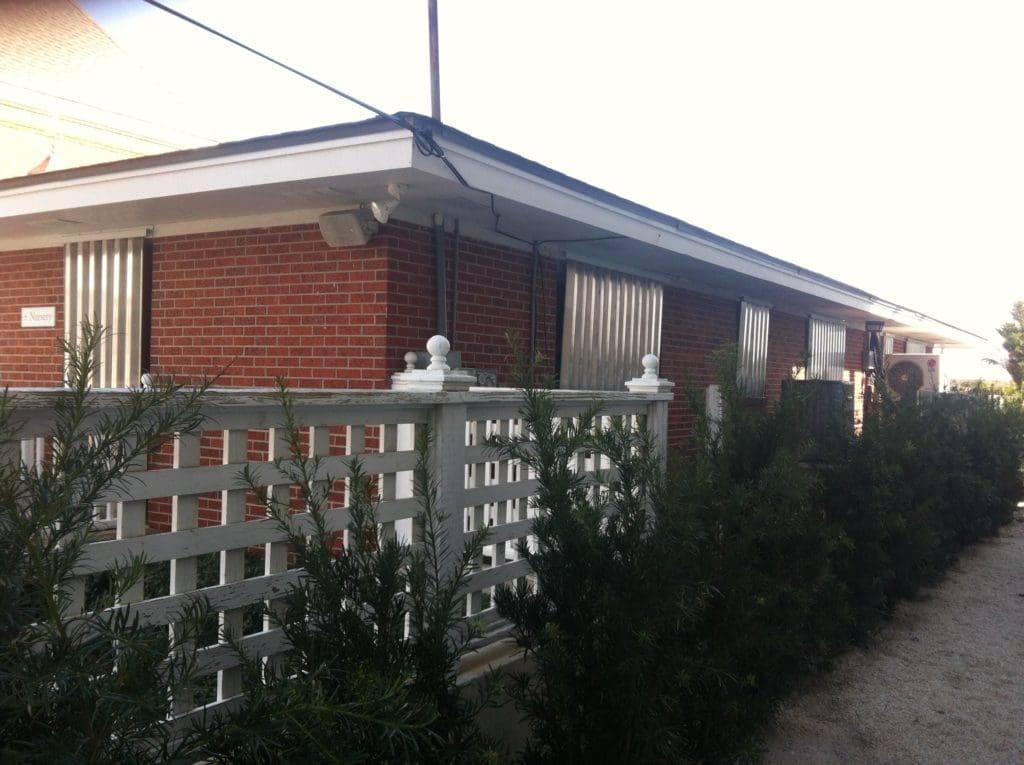
Description: Made from thin sheets of aluminum, these panels are somewhat heave and are mounted over windows and doors. We generally install these shutters only in specific locations, since they are the most difficult to deploy. We generally say shutters such as accordions take 30 minutes – 1 hour to deploy an entire home depending on the size, but panels on the same home may take a day or more.
Pros:
- Cost-effective and easy to store.
- Solid protection against wind and debris.
- The most budget-friendly option.
- No maintenance at all, other than cleaning the tracks for aesthetics. Very hard to end up in a situation with non-functional shutters during a storm.
- Clear panels available to allow some light penetration. We will give a few free clear panels with the order of aluminum storm panels to allow more light penetration. There is an uncharge if you want all panels clear.
Cons:
- Requires manual deployment for each storm. Requires vastly more time and effort to deploy.
- Need storage space, as they can be bulky when not in use.
- Clear panels can get scratched and cloudy if stored improperly
Pricing: Usually costs around $18 per square foot.
7. Rolldown Shutters
Description: Made from extruded aluminum, roll down shutters are an excellent way to protect your home from storms in a quick and efficient manner whether motorized, pulldown, or crank operated. Slats roll up into the hood for excellent concealment and give the typical “hurricane shutter” look.
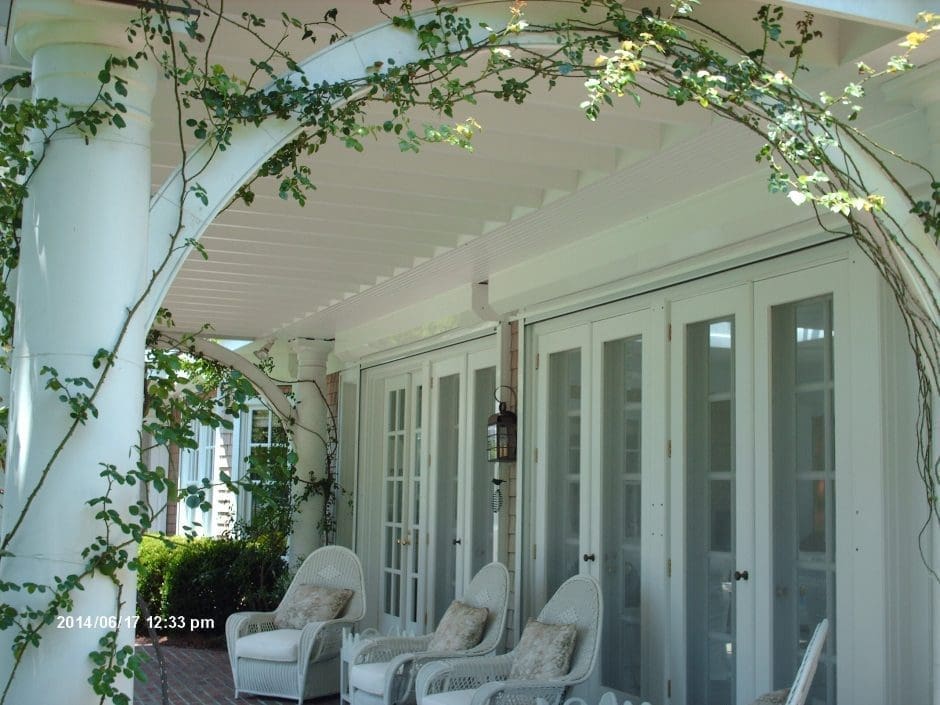
Pros:
- Can be integrated into home automation systems for added convenience.
- Offers aesthetic flexibility as they can be customized to match the home’s exterior. Can consult with a contractor for a renovation or new build to completely conceal the shutter for the ideal aesthetics. Many new builds in Topsail Beach are consulting with contractors to do this as it also resists the marine environment better when protected by facia.
- Offers excellent protection and security against storm and vandalism.
- Very easy to use and has the stereotypical “hurricane shutter” look
Cons:
- Higher initial cost compared to other shutter types.
- Hood can be damaged due to the thin facia material.
- Maintenance is needed for the motorized components to ensure long-term functionality.
Pricing: Generally pricing starts at $42 square foot, however custom work like overly large shutters, custom work with contractors, and motorization/pulldown conversions will cost more.
Conclusion
In Topsail Beach, NC, where the beauty of the coast meets the reality of hurricane threats, investing in hurricane shutters is not merely an option but a necessity. Each style of hurricane shutter—whether it be Bahama shutters, accordion shutters, hurricane screens, colonial shutters, ClearTek rated polycarbonate, aluminum and clear storm panels, or rolldown shutters—offers unique advantages and disadvantages.
When choosing the right hurricane shutter for your home, consider factors such as aesthetics, ease of use, level of protection, and cost. Bahama shutters add charm; accordion shutters offer flexibility and strength and are possibly the best combination of ease of use and price. Hurricane screens and ClearTek rated polycarbonate provide visibility and light but have some installation restrictions on most homes. Meanwhile, aluminum storm panels are affordable but difficult to use, and rolldown shutters offer convenience but can be a substantial initial investment.
Ultimately, the best choice depends on your specific needs, budget, and the desired look for your home. Preparing for hurricane season means prioritizing safety while still maintaining the beauty of your property, and with the right shutters, you can achieve both. Call our team today to request your free estimate and consultation.
